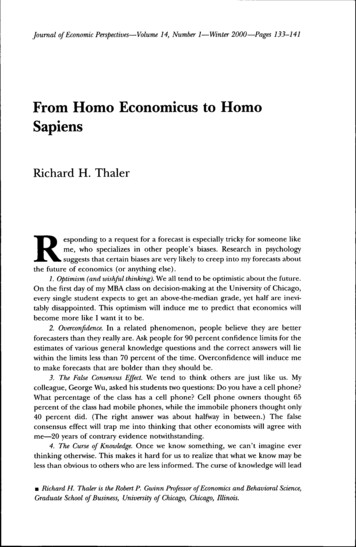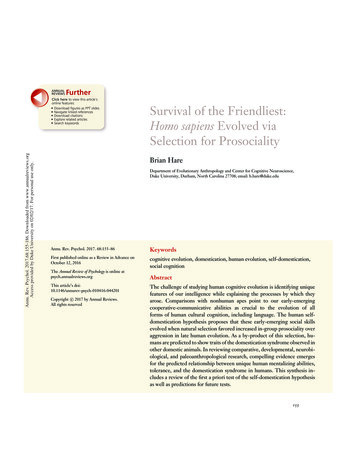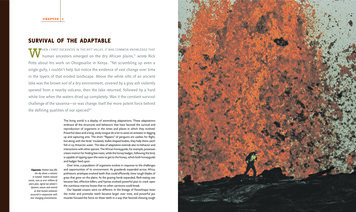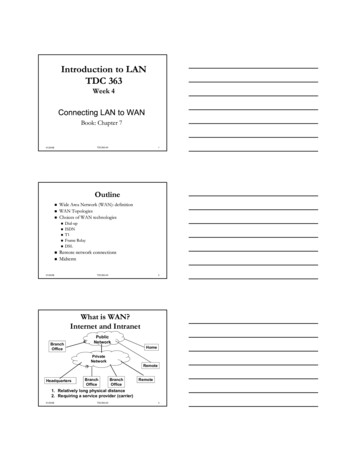
Transcription
Joumal of Economic Perspectives—Volume 14, Number 1—Winter 2000—Pages 133-141From Homo Economicus to HomoSapiensRichard H. ThalerResponding to a request for a forecast is especially tricky for someone likeme, who specializes in other people's biases. Research in psychologysuggests that certain biases are very likely to creep into my forecasts aboutthe future of economics (or anything else).1. Optimism (and wishful thinking). We all tend to be optimistic about the future.On the first day of my MBA class on decision-making at the University of Chicago,every single student expects to get an above-the-median grade, yet half are inevitably disappointed. This optimism will induce me to predict that economics willbecome more like I want it to be.2. Overconfidence. In a related phenomenon, people believe they are betterforecasters than they really are. Ask people for 90 percent confidence limits for theestimates of various general knowledge questions and the correct answers will liewithin the limits less than 70 percent of the time. Overconfidence will induce meto make forecasts that are bolder than they should be.3. The False Consensus Effect. We tend to think others are just like us. Mycolleague, George Wu, asked his students two questions: Do you have a cell phone?What percentage of the class has a cell phone? Cell phone owners thought 65percent of the class had mobile phones, while the immobile phoners thought only40 percent did. (The right answer was about halfway in between.) The falseconsensus effect will trap me into thinking that other economists will agree withme—20 years of contrary evidence notwithstanding.4. The Curse of Knowledge. Once we know something, we can't imagine everthinking otherwise. This makes it hard for us to realize that what we know may beless than obvious to others who are less informed. The curse of knowledge will lead Richard H. Thaler is the Robert P. Gwinn Professor of Economics and Behavioral Science,(graduate School of Business, University of Chicago, Chicago, Illinois.
134Journal of Economic Perspectivesme to think that others will have read the same articles I have, and have learned thesame lessons from them (lessons I now take for granted), when in fact others havebeen busy reading entirely different material, and have never even heard of thefindings that have so influenced my thinking.In making some forecasts for the future of economics, it would be embarrassing to commit (in writing) all the mistakes I spend weeks warning my students toavoid. However, the alternatives are not very attractive, either. Rationally, I realizethat the forecast most likely to be right is to predict that economics will hardlychange at all. (Have I mentioned status quo bias?) Although such a forecast has thevirtue of brevity, it would not make very interesting reading (or writing). So, withtrepidation, I am going to make six bold predictions about how economics willdevelop over the next couple decades, forecasts that are guaranteed to containevery bias mentioned above, as well as some others. You have been warned.Homo Economicus Will Begin Losing IQ, Reversing a 50-yearTrendEconomics in the first half of the 20th century was much more of a socialscience. Writers such as Irving Fisher and John Maynard Keynes stressed psychological factors in their explanations of economic behavior (Loewenstein, 1992).With the mathematical revolution that began to take off in the 1940s with the likesof John Hicks and Paul Samuelson, economic agents began to be more explicitlyoptimizing. In the 1950s, economists who began formalizing the micro foundationsof Keynes developed more rational models; for example, compare Keynes's simpleconsumption function with the life-cycle hypothesis, and then with the rationalexpectations hypothesis of Muth, Lucas, and so on. Eventually the models came toinclude agents that detractors called "hyperrational." The aesthetic in the fieldbecame that if the agents in model A are smarter than the agents in Model B, thenModel A is better than Model B. The IQ of Homo Economicus became boundedonly by the IQ of the smartest economic theorist!My prediction is that this trend will be reversed in favor of an approach inwhich the degree of rationality bestowed to the agents depends on the contextbeing studied. To illustrate how this can work in practice, consider the "guess thenumber" game first studied by Rosemarie Nagel (1995). In this game, contestantsare told to guess a number from 0 to 100, with the goal of making their guess asclose as possible to two-thirds of the average guess. In a world where all the playersare known to be fully rational, in the sense that they will form expectations aboutthe guesses of others can carry out as many levels of deduction as necessary, theequilibrium in this game is zero.In any other setting, however, guessing zero is not a good strategy. Recently, Ihad the opportunity to play this game for quite large stakes (Thaler, 1997). At myrequest, the Financial Times ran a "guess the number" game contest using the rules
Richard H. Thaler135described above and offered two business class tickets from London to the UnitedStates as a prize (worth over 10,000). Only integer guesses were permitted.Although many contestants did guess zero or one, the most popular guesses were3.S (the right guess if everyone else chooses a number at random) and 22 (the rightguess if everyone else picks 3. ). The average guess was 18.91 and thus the winningguess was 13. Although modeling how this game is actually played is not easy, somelessons are clear enough. An appropriate model would have to allow for two kindsof heterogeneity in sophistication. First, agents differ in how many levels of processing they engage in (33 is one level, 22 is two levels, and so on). Second, thereis heterogeneity in how much agents think about the behavior of other agents.Agents who guess zero are sophisticated on the first dimension and naive on thesecond. Many economists fall into this category (due in part to the False ConsensusEfFect and the Curse of Knowledge!) Sophisticated economic models will haveagents that are both more and less sophisticated than the agents we are used tomodeling. I predict this sort of modeling will be the norm in the future.Homo Economicus Will Become a Slower LeamerMost economic models have no reason to introduce learning because agentsare assumed to solve the relevant problem correctly on trial one. When learning isexplicitly introduced. Homo Economicus (hereafter abbreviated HE, with no gender inference intended) is typically taken to be a quick study. If, perchance, HEmakes an error, HE quickly learns to correct it. However, the students I have taughtover the years, even at our best universities such as Cornell, MIT, and Chicago, area litde slower on the uptake. Even after hearing what is, to my unbiased view, acompletely clear explanation, they still often make a mistake in applying a conceptif the context is slightly disguised. This is why putting a question about the first partof the course on an exam covering the later part of the course is considered sounfair by the students.The problem with many economic models of learning is that they seem toapply to a very static environment. In fact, stich models seem to be directlyapplicable only to the situation in which Bill Mtirray finds himself in the movieGround HogDay. In that movie. Bill Murray is a TV weatherman sent to report onwhether the groundhog sees his shadow on Feb. 2. Murray's character ends upreliving the same day over and over again. Although he is a slow learner, theopportunity to rerun the same day repeatedly, and to learn from the consequencesof his actions each time, creates a controlled experiment in which he is able tolearn many things eventually, from how to prevent accidents to how to play thepiano. Alas, life is not like Ground Hog Day. In life, each day is different, and the' The idea that economic models of learning are similar to this movie evolved during a conversation Ihad with Colin Camerer during a Russell Sage Foundation summer institute on betiavioial economics.It is a safe bet that we each think it was our idea.
136Joumal of Economic Perspectivesmost important of life's decisions, such as choosing a career or spouse, offer onlya few chances for learning! I predict that economic models of learning will becomemore sophisticated by making their agents less sophisticated and giving greaterweight to the role of environmental factors, such as the difficulty of the task and thefrequency of feedback, in determining the speed of learning. This means thatmodels of saving for retirement (a hard problem with few opportunities forlearning) should be very different from models of frequency of milk purchases(easier, with many learning chances).The Species Pojpulating Economics Models Will Become MoreHeterogeneousAlthough you can get the wrong impression reading economics textbooks andjournal articles, most economists are happy to admit they know many people whosereasoning is quite flawed: their spouses, children, students, colleagues, deans,college presidents, and so on. When pressed on why it is reasonable to baseeconomic models exclusively on rational representative agents, while at the sametime thinking that most of the people they interact with are at least occasionallybozos, typically some kind of evolution plus markets argtiment is ofFered. Theargument proceeds something like this. Suppose there were some less-than-fullyrational agents. I like to call them "quasi-rational," meaning trying hard but subjectto systematic error. Once these quasi-rationals started interacting with rationaltypes, the rationals would quickly take all their money, after which the quasi's wouldeither learn or would be rendered economically irrelevant. Rarely is this argumentspelled out careftilly, and for good reason: It is false!When rational agents interact with quasi-rational agents, the rational agentscannot be expected either to take all the quasi's money, or to set prices unilaterally.Indeed, careful analyses of such situations in financial markets, such as those byDe Long et al. (1990), show that it is possible for the quasi's—called "noise traders"in finance circles—to end up richer than their rational counterparts (by inadvertently bearing more risk). Although papers mixing rational and quasi-rationalagents have become popular over the past decade or so, it is still considered anovelty to have some quasi's in the model. In workshops, presenters of such modelsstill feel compelled to explain why they need to have these quasi's mucking thingsup. My prediction is that in future seminars presenters will have to explain why theyare using a model with only rational agents (unless the paper is on the history ofeconomic thought). After all, analyses of market interactions between agents ofvarious types is exactly what differentiates economics from other social sciences.Psychologists, sociologists and anthropologists might help us improve our characterizations of economic behavior, but economists are the only social scientists withthe tools to analyze what happens in market contexts.Note that I am not predicting that HE will disappear from economics research.
Erom Homo Economicus to Homo Sapiens137At least two roles should remain. First, many aspects of the standard HE model areuseful as theoretical special cases, much as perfect competition is used today.Second, when a few highly trained special agents can influence markets, as infinancial markets, they can be usefully modeled as HEs, especially in models withheterogeneous agents.['Economists Will Study Human CognitionOne way of modeling bounded rationality is to reduce the informationprocessing capabilities of the agents; for example, in the case of the numbers gamediscussed earlier, by assuming that individuals will only do two steps of backwardinduction rather than infinite steps. This is a sensible initial approach, but we cando more that make HE dumber. A more interesting research agenda is to attemptricher characterizations of economic agents via a better understanding of humancognition. This, I predict, will be a major area of effort over the next two decades.Some successful examples published in the last 20 years prove that this kind of workis both feasible and useful.The most significant exemplar is the "prospect theory" of Daniel Kahnemanand Amos Tversky (1979). This posidve theoiy of decision-making under uncertainty manages to capture an enormous amount of psychological wisdom in itsS-shaped "value function." The value function shows changes in material well-beingon the horizontal axis, rather than levels as in expected utility theory, becausehumans (and other species) have a strong tendency to adapt to their environmentand react only to perceived changes. The vertical axis shows happiness resultingfrom these changes. The S-shape displays diminishing marginal sensitivity to bothgains and losses, a basic finding in the psychology of perception (psychophysics).Finally, the loss function is steeper than the gain function, a property that has cometo be known as loss aversion. Losses hurt about twice as much as gains make us feelgood. These three psychological concepts yield plenty of explanatory power, havingbeen used to explain as diverse phenomena as consumers reaction to price changesin the supermarket to the labor supply behavior of cab drivers (Camerer,forthcoming).There are an enormous number of exciting ways in which a better understanding of human cognition could help us do better economics. I'll suggest two here.First, there is a problem with prospect theory that cognitive psychology might helpus fix; namely, the theory is incomplete. Prospect theory tells us that choicesdepend on the framing of a problem, but does not tell us how people willspontaneously create their own frames. By direcdy studying how people attackdecision-making problems, we may learn more about this problem-edidng process. Second, though we have given considerable attention in recent years to the impli Some of what we know about this problem falls into the category of "mental accounting." For a ctn rentreview of this literature, see Thaler (1999).
138Joumal of Economic Perspectivescations of bounded rationality, we have spent less time studying the impact ofbounded memories. A simple example is "hindsight bias": after the fact, events thathappen are thought to have been predictable. For example, one year in my class Iasked my students on the first day of class (in late January) to make predictionsabout stock market returns for the next two months. Their forecasts were bearish:they thought it was more likely that the market would go down than up. Twomonths later I asked them to tiy to recall their earlier forecast. They rememberedbeing bullish. Needless to say, the market rose sharply over this two month period.This phenomenon (related to the curse of knowledge mentioned earlier) isboth strong and robust, and has powerful implications for economics. Consider, forexample, the role of hindsight bias in agency problems. A principal with a biasedmemoiy (that is, any real world principal) will find it veiy difficult to distinguishbetween a bad decision and a bad outcome, since an unlucky exogenous event willbe thought, in hindsight, to have been predictable. Agency theory with absentminded principals (and agents) would be an exciting field of inquiry.' Economists Will Distinguish Between Normative and DescriptiveTheories/Psychologists distinguish between two kinds of theories: normative and descriptive. To them, normative theories characterize rational choice: exampleswould include the axioms of expected utility theory and Bayes' rule. Descriptivetheoiies tiy to characterize actual choices. Prospect theory is an example of adescriptive theoiy. Agents who choose according to prospect theory violate fundamental axioms of rational choice; for example, under certain circumstances theywill choose option A over B even when B dominates A, as long as the dominanceis not too obvious.I would not want to call such choices rational, but since people do choose themin real life, high stakes situations, it is important that economists develop modelsthat predict such behavior. Economists have traditionally used one theory to sei-veboth the normative and descriptive purposes. Expected utility theory and thelife-cycle theoiy of saving are rational (normative) models that economists haveused also as descriptive models. Occasionally economists have proposed explicidydescriptive theoiies, such as William Baumol's (1967) theoiy of the firm in whichmanagers maximize sales subject to a profit constraint. However, such descriptivetheories have not won great acceptance. Part of the resistance to such theories, Ithink, has been based on a misunderstanding of the issues raised above regardinghow competition will force changes in quasi-rational behavior. For example, Baumol often heard the critique that firms that maximized sales would inevitably losemarket share to competing firms that were tiying to maximize profits. The self-For a clever example of what absent-minded economics might look like, see Mullainathon (1999).
Richard H. Thaler139contradictory nature of this critique—that maximizing sales would cause lowermarket share—did not seem to bother (or occur to) its adherents. There is, ofcourse, a perfectly good equilibrium in which some firms are willing to accept lowerprofits in order to be bigger, and such firms take market share away from profitmaximizing competitors, not vice versa. Similarly, if a baseball team owner choosesto buy a World Series victory at the expense of profits, the profit-maximizing ownersof other teams can do little except become even richer losers.One additional point about descriptive theories: they are, of necessity, drivenby data. Baumol's sales maximization hypothesis was suggested to him by conversations with managers. Kahneman and Tversky's prospect theory was derived byexamining hundreds of choices between pairs of gambles. Some economists seemto feel that data-driven theory is, somehow, unscientific. Of course, just the oppositeis true. Copernicus watched the movements of the planets before devising histheoiy that the planets orbit the sun. What makes for a good descriptive theory isout-of-sample tests; for example, the prediction that Pluto would be discoveredbefore telescopes were good enough to see it. So, this prediction leads to anauxiliary prediction that more theorists will pay attention to data.Homo Economicus Will Become More EmotionalThe predictions I have made so far, though fraught with the biases I identifiedearly on, are still somewhat conservative in the sense that lots of good work isalready going on in the directions I suggest that the field will be headed. So, itseems right to offer the slightly more courageous prediction that Homo Economicus will become more emotional, by which I mean that economists will devote moreattention to the study of emotions.To get a sense of what the study of emotions entails, I refer readers to JonElster's (1998) recent article. Although Elster does not define emotions explicitly,he does offer a list of states that he says are unambiguously emotions, of which asubset are: anger, hatred, guilt, shame, pride, liking, regret, joy, grief, envy, malice,indignation, jealousy, contempt, disgust, fear, and, oh yes, love. Elster distinguishesthis list from other "visceral factors" (a more general term, see Loewenstein, 1996)such as pain, hunger, and drowsiness, in that they are triggered by beliefs. Many ofthese emotions are often accompanied by states of physiological arousal, like fear.How can emotions be incorporated into economic analyses? The ultimatumgame offers one simple example. In the ultimatum game one player, the Proposer,is given a sum of money, say 10, and makes an offer of some portion of the money,X, to the other player, the Responder. The Responder can either accept the offer,in which case the Responder gets x and the Proposer gets 10-x, or reject the offerin which case both players get nothing. Experimental results reveal that very lowoffers (less than 20 percent of the pie) are often rejected. Speaking very generally,one can say that Responders react emotionally to very low offers. We might getmore specific and say they react indignantly. What is certain is that Responders do
140Joumal of Economic Perspectivesnot act to maximize their own payoffs, since they turn down offers in which theyreceive a small share of the pie and take zero instead. Matthew Rabin's (1993)model of fairness, which is an attempt to explain such behavior (specifically, theresisting of unfair offers) is based partly on emotions.Rejecting a positive offer in the ultimatum game is spiteful; it hurts bothparties. Unfortunately, such behavior is more common than economic theorizingwould lead us to expect. I need only mention the word "divorce" to bring to mindall-too-many familiar examples. Spite is not confined to ex-spouses. The Coasetheorem prediction that the allocation of resources is independent of the assignment of property rights depends on the willingness of the parties to a lawsuit torecontract. However, recontracting requires interaction that can be made difficultby spite. In a recent study of this issue. Ward Farnsworth (1999) interviewedattorneys from over 20 nuisance cases in which injunctive relief was sought andeither granted or denied after full litigation before a judge. In not a single case didthe parties even attempt to contract around the court order.ConclusionMy predictions can be summarized quite easily: I am predicting that HomoEconomicus will evolve into Homo Sapiens. This prediction shouldn't be anoutlandish one. It seems logical that basing descriptive economic models on morerealistic conceptions of economic agents is bound to increase the explanatorypower of the models. Still, a conservative economist might (emotionally) scoff: "Ifthis were a better way of doing economics, we would already be doing it that way!"Why aren't all my predictions already true? And why should I expect things tochange?One reason economics did not start out this way is that behavioral models areharder than traditional models. Building models of rational, unemotional agents iseasier than building models of quasi-rational emotional humans. Nonetheless, eachgeneration of scientists builds on the work of the previous generation. Theoremstoo hard to prove 20 years ago are found in graduate student problem sets today.As economists become more sophisticated, their ability to incorporate the findingsof other disciplines such as psychology improves. Simultaneously, we can hope thatnew scholars in other disciplines can do for economics what cognitive psychologistssuch as Kahneman and Tversky have already done: offer us useful findings andtheories that are relatively easy to incorporate into economic models.I will close with a very safe prediction. If some of my predictions about thefuture of economics come true, young economists will have done the work. (Oldeconomists, like me, can't learn new tricks any better than dogs.) A few of theseyoung economists are already on the horizon. Others will follow. The author would like to thank Colin Camerer, Peter Diamond, George Loewenstein, JesusSantos, Andrei Shleifer, Cass Sunstein and all the editors for helpful comments.
From Homo Economicus to Homo Sapiens141ReferencesBaumol, William. 1967. Business Behavior,Value and Growth. New York; Harcouit Brace.Camerer, Colin, forthcoming. "Prospect Theoiy in the Wild." In Choices, Values, Frames. Kahneman, Daniel and Ainos Tversky, eds. NewYork: Cambridge University Press.De Long, J. Bradford, Andrei Shleifer, Lawrence Summers, and Robert Waldmann. 1990."Noise Trader Risk in Financial Mdvkets." foumalof Political Economy. 98, pp. 703-38.Elster, Jon. 1998. "Emotions and EconomicTheory." Journal of Economic Literature. March,XXXVl, pp. 47-74.Famsworth, Ward. 1999. "Do Parties to Nuisance Cases Bargain After Judgement? AGlimpse of the Cathedral." Univeisity of ChicagoLaw Review, 66, pp. 373-436.Kahneman, Deuiiel and Amos Tversky. 1979."Prospect Theoiy: An Analysis of Decision underRisk." Econometrica. 47:2, pp. 263-91.Loewenstein, George. 1992. "The Fall andRise of Psychological Explanations in the Eco-nomics of Intel temp6ral Choice," in Choice OverTime. Loewenstein, George and Jon Elster, ed.New York: Russell Sage Foundation, pp. 3-34.Loewenstein, George. 1996. "Out of Gontrol:Visceral Influences on Behavior." OrganizationalBehavior and Human Decision Processes. March,65:3, pp. 805-24.Mullainatbon, Sendhil. 1999. "A MemoiyBased Model of Bounded Rationality," workingpaper, MIT Economics Department.Nagel, Rosemarie. 1995. "Unraveling inGuessing Games: An Experimental Study." American Economic Revieiu. 85:5, pp. 1313-1326.Rabin, Matthew. 1993. "Incorporating Fairness into Game Theory and Economics." American Economic Revieiu. December, 85, pp. 12811302.Tbaler, Richard H. 1997. "Giving Markets a Human Dimension." Financial Times. 6,Jtine 16, 1997.Thaler, Richard H. 1999. "Mental AccountingMsXlers." Journal of Behavioral Decision-making. 12,pp. 183-206.
Sapiens Richard H. Thaler R esponding to a request for a forecast is especially tricky for someone like me, who specializes in other people's biases. Research in psychology suggests that certain biases are very likely to creep into my forecasts about the future of economic











